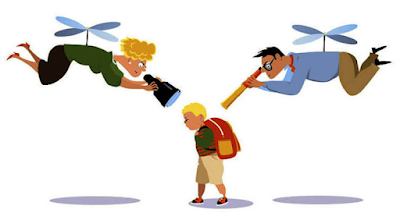The foolish couple
The war was over and the land was at peace. Rod Cunningham the soldier packed his bags and set off into the world with no address to go to. Always short of money, he lived by his wits, doing odd jobs wherever he went. He breezed through towns, trekked up mountains and went through valleys, looking to make a quickbuck.
One day, he arrived at a farm. There lived a foolish farmer and his equally hare-brained wife. That afternoon, the farm owner had gone to the market to buy seeds.
Before he left, he gave his wife ten gold coins and said, "Wife, keep this money safe till I get back."
The farmer's wife tucked away the money in her cupboard and went about doing her chores.
Rod knocked at the door. The woman called out, "Who's there?"
Rod answered, "I am Rod Cunningham."
"Where are you from?"
"Paradise."
The woman flung open the door and exclaimed, "O my goodness! Have you seen my dear departed mother?"
Without batting an eyelid, Rod replied, "Yes, I have."
"Is she well?" asked the farmer woman anxiously.
Rod pulled a sorry face and shook his head.
"The old lady is unhappy. She spins all day and eats only dry bread," he said.
"Does she have a message for me?"
"Yes. She wants money to buy a warm shawl. A bottle of wine and a wedge of cheese, too."
The foolish woman immediately went down to her cellar and brought out two bottles of wine and some cheese. Then she fetched the bag of coins in her cupboard and handed them all to Rod.
She said, "Give this money to my mother. Tell her to buy whatever she needs and then send back the change."
Rod chuckled with delight as he gladly pocketed all that the woman offered and made good his escape.
When the farmer returned, he asked for the bag of coins. His wife excitedly told him about Rod. The farmer cried in anger, "You silly goose! I have never heard of such nonsense!"
Wasting not a moment, the farmer mounted his horse and rode furiously to catch up with the trickster. Hearing the sound of hoofs, Rod guessed what had happened and quickly thought of a ploy.
He lay down on the grass, shading his eyes with one hand and pointing to the sky with the other. As man and horse drew close, he exclaimed, "The Lord be praised! It is such a wonderful sight!"
The farmer asked, "What do you see?"
"A man soaring into the clouds, as he enters the pearly gates of heaven."
Curious, the farmer asked, "Can you still see him?"
Rod said, "Of course, and you can too, if you lie down next to me."
The farmer hesitated and said, "Someone has to hold the horse."
Rod sprang up and offered to hold the horse's reins while the farmer lay down to catch a glimpse of the divine passage.
"I can't see anything!" cried the farmer.
"Cover your eyes and you will see a man flying away from you."
Just as the man placed his hand over his eyes, Rod mounted the horse in a flash and galloped away before the farmer could do anything to stop him.
The farmer hung his head low and slowly made his way home on foot, poorer by ten gold coins and a fine horse.











